甘肃省武威第五中学八年级英语上册 Unit 7 Will people have robots?Section A(2a-2d)导学案
八年级英语上册Unit7Willpeoplehaverobots全部重要知识点(带答案)

八年级英语上册Unit7Willpeoplehaverobots全部重要知识点单选题1、There ______ an English show this weekend. Shall we go and watch it?A.are going to beB.wasC.will beD.were答案:C句意:这个周末将有一场英语表演。
我们去看好吗?考查there be句型的一般将来时。
根据“There”及“this weekend”可知,此句要用there be句型的一般将来时there is/are going to be或there will be的结构,排除B和D选项。
an English show是单数,be要用is,排除A,故选C。
2、We have decided to sell five things ________ we no longer use.A.thatB.whereC.who答案:A句意“我们已经决定卖5个我们不再用的东西”。
本题考查定语从句。
A.关系代词,指人,在从句中作主语、宾语或表语;B.关系副词,表示地点,在从句中作状语;C.关系代词,指人,在从句中作主语和宾语。
本句话中,先行词为five things,指物,且在从句中作宾语,用that,故选A。
3、—Is Helen here?—No, she isn’t here, She ________ in half an hour.A.arrivesB.arrivedC.will arriveD.has arrived答案:C句意:——Helen在这里吗?——不,她不在,她半个小时后就到了。
考查动词时态。
根据“in half an hour”可知,时间为半个小时后,应用一般将来时;其构成为:will+动词原形。
故选C。
4、---It’s reported that Chinese ___________more than 40 minutes a day reading WeChat(微信).---It’s true. But I think WeChat is taking too much of our time.A.spendB.costC.payD.take答案:A试题分析:句意:——据报道中国人一天花费四十多分钟读微信。
甘肃省武威第五中学八年级英语上册Unit7Willpeoplehaverobots?SectionB
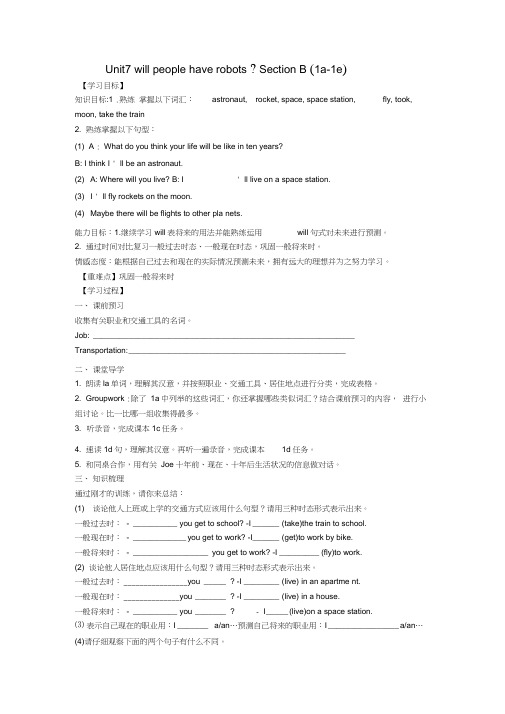
Unit7 will people have robots ? Section B (1a-1e)【学习目标】知识目标:1 .熟练掌握以下词汇:astronaut, rocket, space, space station, fly, took, moon, take the train2. 熟练掌握以下句型:(1) A : What do you think your life will be like in ten years?B: I think I ' ll be an astronaut.(2) A: Where will you live? B: I ' ll live on a space station.(3) I ' ll fly rockets on the moon.(4) Maybe there will be flights to other pla nets.能力目标:1.继续学习will表将来的用法并能熟练运用will句式对未来进行预测。
2. 通过时间对比复习一般过去时态、一般现在时态,巩固一般将来时。
情感态度:能根据自己过去和现在的实际情况预测未来,拥有远大的理想并为之努力学习。
【重难点】巩固一般将来时【学习过程】一、课前预习收集有关职业和交通工具的名词。
Job: ___________________________________________________________Transportation: _________________________________________________二、课堂导学1. 朗读la单词,理解其汉意,并按照职业、交通工具、居住地点进行分类,完成表格。
2. Groupwork :除了1a中列举的这些词汇,你还掌握哪些类似词汇?结合课前预习的内容,进行小组讨论。
比一比哪一组收集得最多。
3. 听录音,完成课本1c任务。
八年级人教版英语上册unit7-Will people have rober-Section A
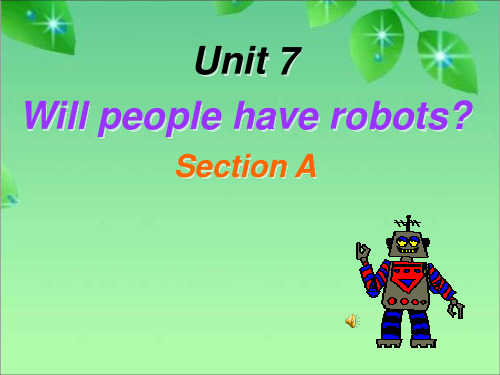
A. Did, do B. Does, do C. Do, do D. Is, doing
3. She dances better than Mary _______.
A. is B. has C. does
D. dance
4. They ______ four English classes a week last term.
Unit 7 Will people have robots?
Section A
100 years from Wnhoawt d…o you think it is?
What do you think life will be?
By the year 3000,you won’t carry a backpack. It will carry you.
trees/pollution/cars/free time
知识点探究
fewer 与less及more表数量的用法
1)few(形容词)几乎没有,很少的,修饰可数名词。
其比较级、最高级为规则变化: few-fewer-fewest
a few表示一些,few带否定含义,意思是几乎没有。
2)little(形容词)很少的,几乎没有的,修饰不可数名 词。
人教版英语八年级上册全册教材全解:人教版英语八年级上册 Unit 7 Will people hav
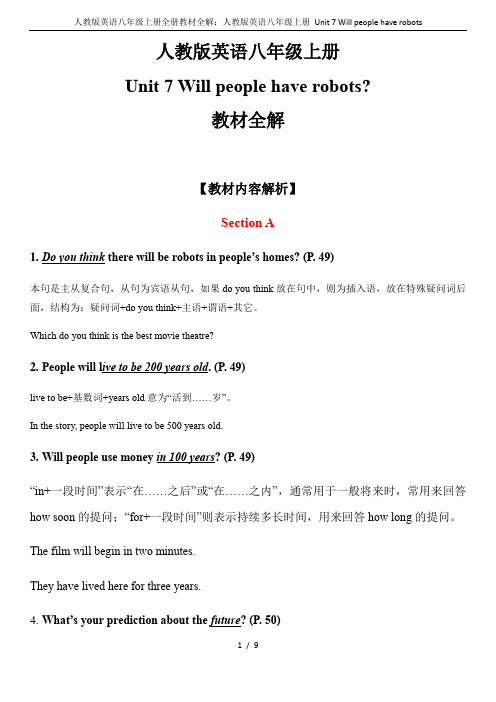
人教版英语八年级上册Unit 7 Will people have robots?教材全解【教材内容解析】Section A1.Do you think there will be robots in people’s homes? (P. 49)本句是主从复合句,从句为宾语从句,如果do you think放在句中,则为插入语,放在特殊疑问词后面,结构为:疑问词+do you think+主语+谓语+其它。
Which do you think is the best movie theatre?2.People will l ive to be 200 years old. (P. 49)live to be+基数词+years old意为“活到……岁”。
In the story, people will live to be 500 years old.3.Will people use money in 100 years? (P. 49)“in+一段时间”表示“在……之后”或“在……之内”,通常用于一般将来时,常用来回答how soon的提问;“for+一段时间”则表示持续多长时间,用来回答how long的提问。
The film will begin in two minutes.They have lived here for three years.4.What’s your prediction about the future?(P. 50)future作名词,表示“将来、未来”,in the future表示“在将来”。
Who knows what will happen in the future.5.I don’t think so.(P. 50)I don’t think so表示“我不这么认为”,肯定形式为I think so。
---Look at the cloud. It is going to rain.---I don’t think so. It will be sunny soon.【拓展】类似的结构还有:I hope so“我希望如此”,I hope not“我希望不是这样”,I’m afraid so“恐怕如此”,I’m afraid not“恐怕不是这样的”。
《Unit-7Will-people-have-robots》的教学设计及其评价
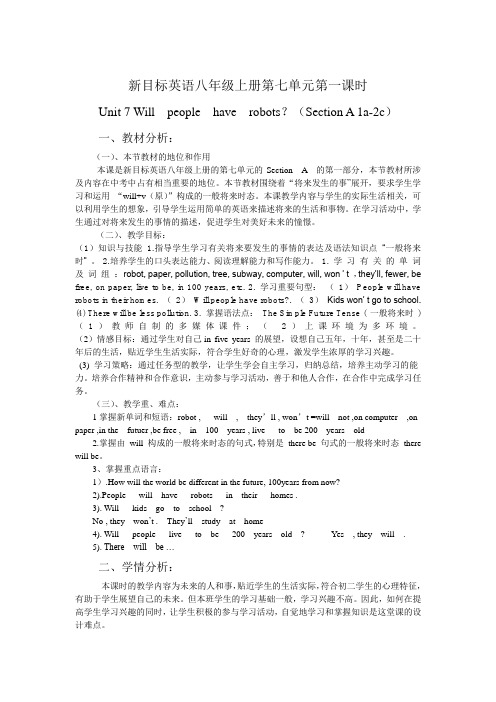
新目标英语八年级上册第七单元第一课时Unit 7 Will people have robots?(Section A 1a-2c)一、教材分析:(一)、本节教材的地位和作用本课是新目标英语八年级上册的第七单元的Section A 的第一部分,本节教材所涉及内容在中考中占有相当重要的地位。
本节教材围绕着“将来发生的事”展开,要求学生学习和运用“will+v(原)”构成的一般将来时态。
本课教学内容与学生的实际生活相关,可以利用学生的想象,引导学生运用简单的英语来描述将来的生活和事物。
在学习活动中,学生通过对将来发生的事情的描述,促进学生对美好未来的憧憬。
(二)、教学目标:(1)知识与技能 1.指导学生学习有关将来要发生的事情的表达及语法知识点“一般将来时” 。
2.培养学生的口头表达能力、阅读理解能力和写作能力。
1. 学习有关的单词及词组:robot, paper, pollution, tree, subway, computer, will, won ’ t ,they’ll, fewer, be free, on paper, live to be, in 100 years, etc. 2. 学习重要句型:(1)People will have robots in their homes. (2)Will people have robots?. (3)Kids won’ t go to school.(4) There will be less pollution. 3. 掌握语法点:The Simple Future Tense ( 一般将来时) (1)教师自制的多媒体课件;(2)上课环境为多环境。
(2)情感目标:通过学生对自己in five years 的展望,设想自己五年,十年,甚至是二十年后的生活,贴近学生生活实际,符合学生好奇的心理,激发学生浓厚的学习兴趣。
(3) 学习策略:通过任务型的教学,让学生学会自主学习,归纳总结,培养主动学习的能力。
(完整版)八年级上册英语第七单元
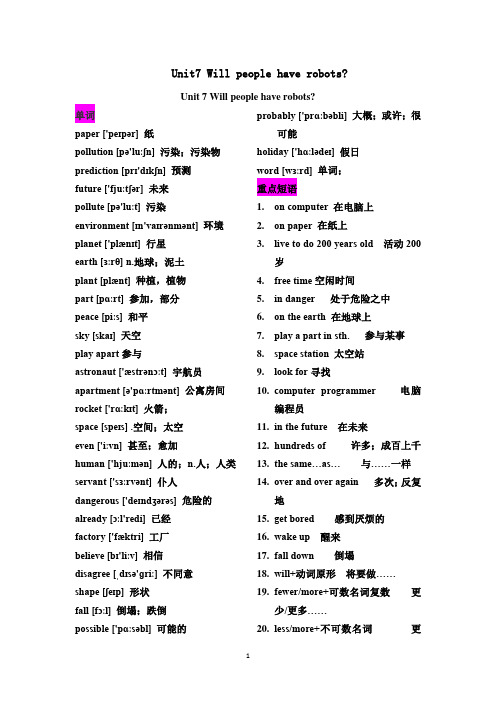
Unit7 Will people have robots? Unit 7 Will people have robots?单词paper ['peɪpər] 纸pollution [pə'luːʃn] 污染;污染物prediction [prɪ'dɪkʃn] 预测future ['fjuːtʃər] 未来pollute [pə'luːt] 污染environment [ɪn'vaɪrənmənt] 环境planet ['plænɪt] 行星earth [ɜːrθ] n.地球;泥土plant [plænt] 种植,植物part [pɑːrt] 参加,部分peace [piːs] 和平sky [skaɪ] 天空play apart参与astronaut ['æstrənɔːt] 宇航员apartment [ə'pɑːrtmənt] 公寓房间rocket ['rɑːkɪt] 火箭;space [speɪs] .空间;太空even ['iːvn] 甚至;愈加human ['hjuːmən] 人的;n.人;人类servant ['sɜːrvənt] 仆人dangerous ['deɪndʒərəs] 危险的already [ɔːl'redi] 已经factory ['fæktri] 工厂believe [bɪ'liːv] 相信disagree [ˌdɪsə'ɡriː] 不同意shape [ʃeɪp] 形状fall [fɔːl] 倒塌;跌倒possible ['pɑːsəbl] 可能的probably ['prɑːbəbli] 大概;或许;很可能holiday ['hɑːlədeɪ] 假日word [wɜːrd] 单词;重点短语1.on computer 在电脑上2.on paper 在纸上3.live to do 200 years old 活动200岁4.free time空闲时间5.in danger 处于危险之中6.on the earth 在地球上7.play a part in sth. 参与某事8.space station 太空站9.look for寻找puter programmer 电脑编程员11.in the future 在未来12.hundreds of 许多;成百上千13.the same…as… 与……一样14.over and over again 多次;反复地15.get bored 感到厌烦的16.wake up 醒来17.fall down 倒塌18.will+动词原形将要做……19.fewer/more+可数名词复数更少/更多……20.less/more+不可数名词更少/更多……21.have to do sth.不得不做某事22.agree with sb. 同意某人的意见23.such+名词(词组)如此……24.play a part in doing sth. 参与做某事25.There will be + 主语+其他将会有……26.There is/are +sb./sth.+doing sth.有……正在做某事27.make sb. do sth. help sb.with sth. 帮助某人做某事28.try to do sth. 尽力做某事29.It’s+ adj.+for sb. to do sth. 对某人来说,做某事……的。
八年级英语上册Unit7Willpeoplehaverobots题型总结及解题方法(带答案)
八年级英语上册Unit7Willpeoplehaverobots题型总结及解题方法单选题1、There _________ a fashion show this weekend. Shall we go to watch it together?A.will haveB.will beC.is going toD.is going to have答案:B句意:这个周末将有一场时装秀。
我们一起去看好吗?考查there be句型和时态。
根据“There”可知,此处是there be结构,be动词不能用其他词代替,排除A/D 选项;结合“this weekend”可知,句子应用一般将来时,结构是there will be或there is going to be,故选B。
2、It usually takes us quite a long time to ________ master a skill. A.trulyB.simplyC.hardlyD.probably答案:A句意:我们通常需要很长时间才能真正掌握一项技能。
考查副词辨析。
truly真正地;simply简单地;hardly几乎不;probably大概。
根据“It usually takes us quite a long time to”可知,需要很长时间才能真正地掌握一项技能,结合选项,truly符合句意。
故选A。
3、Nora opened the box. To her surprise, ______________ was a gold watch. A.outsideB.insideC.besideD.behind答案:B句意:Nora打开盒子,令她吃惊的是里面有一块金表。
考查介词。
outside在外面;inside在里面;beside在旁边;behind在后面。
根据Nora opened the box.可知她打开盒子后发现的,应是在盒子里面,故用inside,故选B。
人教新目标八年级英语上册教案Unit7Willpeopleha
精品基础教育教学资料,请参考使用,祝你取得好成绩!Unit 7 Will people have robots?Section B (2a-2e)【学习目标】1.掌握下列单词的读音和用法。
human servant, dangerous, already, factory, believe, disagree, shape, fall, possible,2.进一步学习掌握一般将来时态,学会运用下列句型:Today there are already robots working in factories.Robots will never be able to wake up and know where they are.Some will look like humans, and others might look like animals.So I’ll probably just like a bird.3.能够用所学的单词和句型进行读写训练。
4.通过拓展阅读,了解未来机器人的作用及对人类的影响。
【重点难点】重点 1. 掌握本课词汇:human servant, dangerous, already, factory, believe,disagree, shape, fall, possible,2. 掌握并会运用本课时句型难点: There be 句型的一般将来时【新知预习】用there be 或have的适当形式填空。
1. an English speech contest tomorrow.2 you an questions?3. I a pet dog when I was seven years old.4. no schools in this village 20 years ago.5. She a car and a house in 10 years . But now she nothing because she no money.6. some students and a teacher in the classroom.7. In 25 to 50 years, more robots everywhere and humans less work to do.8. They a lot of housework to do every day.【课堂探究】探究1 But many scientists disagree with Mr White .However ,they agree it may take hundreds of years. 句中agree 与disagree 为不及物动词,它们互为反义词。
八年级英语上册 Unit 7 Will people have robots?(第2课时)说课稿
八年级英语上册 Unit 7 Will people have robots?(第2课时)说课稿一. 教材分析《八年级英语上册》Unit 7 “Will people have robots?” 是人教版新目标英语教材的一个单元。
本单元主要围绕未来科技的发展,特别是机器人在日常生活中的应用进行讲解。
通过本单元的学习,学生可以掌握一般将来时的被动语态,提高自己的听说读写能力,并激发他们对未来科技的想象和思考。
二. 学情分析八年级的学生已经掌握了英语学习的基本语法和词汇,具备一定的听说读写能力。
他们对新科技充满好奇,善于接受新鲜事物,但同时也可能对一些抽象的概念和语言表达感到困惑。
因此,在教学过程中,我们需要关注学生的个体差异,因材施教,激发他们的学习兴趣和积极性。
三. 说教学目标根据《义务教育英语课程标准》和教材内容,本节课的教学目标如下:1.知识目标:学生能够掌握一般将来时的被动语态,理解与未来科技相关的词汇和表达。
2.能力目标:学生能够在真实情境中运用所学知识进行交流,提高听说读写能力。
3.情感目标:激发学生对未来的想象和思考,培养他们对科技发展的积极态度。
四. 说教学重难点1.教学重点:学生能够熟练运用一般将来时的被动语态进行表达。
2.教学难点:学生能够准确理解与未来科技相关的词汇和表达,以及在真实情境中运用所学知识进行交流。
五. 说教学方法与手段本节课采用任务型教学法,结合情境教学法和分组合作学习法,利用多媒体教学手段,激发学生的学习兴趣,提高他们的参与度和积极性。
六. 说教学过程1.导入:通过展示一段关于未来科技的短片,引发学生对未来的想象,激发他们的学习兴趣。
2.呈现:教师通过PPT展示本节课的主要内容,引导学生关注一般将来时的被动语态和与未来科技相关的词汇。
3.操练:学生分组进行角色扮演,运用所学知识进行对话,教师给予指导和反馈。
4.巩固:学生完成一组有关未来科技的练习题,检测他们对知识的掌握程度。
甘肃省武威第五中学八年级英语上册 Unit 7 Will people have robots?Se
Unit7 will people have robots?Section A(3a)【学习目标】知识目标:1.熟练掌握以下词汇pet, probably, be good for, wear, holiday,both..and..,the meaning of,during the week,interesting,on the weekend2.熟练掌握以下句型:1) In 20 years,I think I’ll be a newspaper reporter.(2) On the weekend, I’ll look less smart but I wi ll be more comfortable.(3) What will your… be like ?能力目标:能完成阅读任务并能够运用3a核心句型,写出对自己未来生活的预测和设想。
情感目标:每个人都应该拥有梦想和人生目标,并且为之不懈努力直至梦想实现。
【重难点】巩固一般将来时【学习过程】一、课前预习写出下列单词短语从现在起_____________ 太空站______________落下____________去滑冰_______________ 爱上__________________能够……世界杯 ___________未来________________寻找_______________作为一名记者会见很多有趣的人 10年以后__________________单独生活_________________饲养宠物____________________有朝一日,某天______________ 二十年以后为自己工作___________________飞往月球___________________二、课堂导学1.3a,用方框里的单词完成短文。
2. 自主完成3b和3c.将你写的短文工整的抄在3c处。
3. 完成self check练习题。
- 1、下载文档前请自行甄别文档内容的完整性,平台不提供额外的编辑、内容补充、找答案等附加服务。
- 2、"仅部分预览"的文档,不可在线预览部分如存在完整性等问题,可反馈申请退款(可完整预览的文档不适用该条件!)。
- 3、如文档侵犯您的权益,请联系客服反馈,我们会尽快为您处理(人工客服工作时间:9:00-18:30)。
Unit7 will people have robots?Section A(2a-2d)
【学习目标】
知识目标:掌握新词汇pollution prediction environment planet and so on.
能力目标:more, less, fewer的用法
情感目标:学会积极的心态去面对未来的变化。
注意保护环境、爱护地球。
【重难点】more, less, fewer的用法
【学习过程】
一、课前预习练一练
更少的污染 ______________ 更少的水 ________________
更多的食物更少的树木 ______________
更少的时间 ______________ 更少的汽车 ___________
二、课堂导学
1.完成2a;圈出你听到的的单词。
2. 完成2b;听录音,在你听到的预言前打√。
3.完成2c和2d;用2a和2b里面的预言做对话。
三、知识梳理
复习几个不定代词
1. more +可数名词/不可数名词 more songs更多的歌曲 more juice更多的果汁
2. less + 不可数名词 less news 更少的消息
3. fewer + 可数名词 fewer actors 更少的演员
(1) fewer译为______,是______的比较级,修饰___________(复数/不可数) 名词。
(2) less译为_______,是__________的比较级,修饰__ ____ (复数/不可数)名词。
(3) more译为______,是_______或______的比较级,修饰___(复数/不可数)名词
练习:根据表格内容,用fewer, less, more填空。
Now In 100 years
In 100 year s…
1.There will be _________ houses.
2.There will be __________pollution.
3.There will be __________ schools.
4.There will be ___________clean water.
5.There will be ___________snow.
6.There will be _________movie theaters.
四、当堂检测Ⅰ. 将下列句子译成英语。
1. 明天的城市汽车会更少,地铁会更多。
There ________ ________ _________cars and _________subways in the city.
2. 城市的污染会更少,人口会更多。
There _________ ________ __________ _________ more people in the city tomorrow.
3.那么将来会是什么样?
So will the future ?
4.每个人都应该参与到拯救地球中来。
Everyone should (save)the Earth.
用所给动词的适当形式填空。
(1) I_________(study)in high school ten years ago, and now I_________(be)a college student. In ten years, I__________(be)a lawyer.
(2) He_________(live)in a big city now. He _________(go)to the country next month.
(3)Kate often _________(watch)TV at night, but this evening she ________(watch)a new movie in the cinema.
五.当堂检测2
用所给词的适当形式填空
1.The more you are careful, the (little)mistakes(错误) you make.
2.I (be)a college student in five years.
3.Five years ago, J ane (be)a little girl.
4 .What you (do)tomorrow?
5.There ___________(not) be any paper books. Everyone will have books on computers.
6.Where do you think Sally _____________ (work) ten years from now?
7.________________(be) you at school yesterday evening? We had an exciting party.
8.When I grow up, I _______________ (be) a famous pilot.
9.Tomorrow __________ ________ (be) a su nny day again.
10.What are you __________ (go) to do this afternoon?
11.We_______ (be) _________ ________(go) have a meeting tomorrow.
12. There will be _________ (much)pollution this year than last year.
六【达标测评】
1. There will be a new subject next term.
There ______ ________ a new subject next term. (变为否定句)
________ there _______ a new subject next term? (变为一般疑问句)
Yes, there _______. / No, there _________. (作出肯答和否答)
2. Sally will play tennis after school.
Sally _______ _______ tennis after school. (变为否定句)
________ Sally ________ tennis after school ? (变为一般疑问句)
Yes, she _______. / No, she _________. (作出肯答和否答)
3. Jim will be a pianist when he grows up. (对划线部分提问)
_______ _______ she _______ when he grows up?
4. I ________ (visit) my uncle tomorrow.
5. They ________ (play) soccer if it doesn’t rain.
6. He ________ (help) you with your English this evening.。
